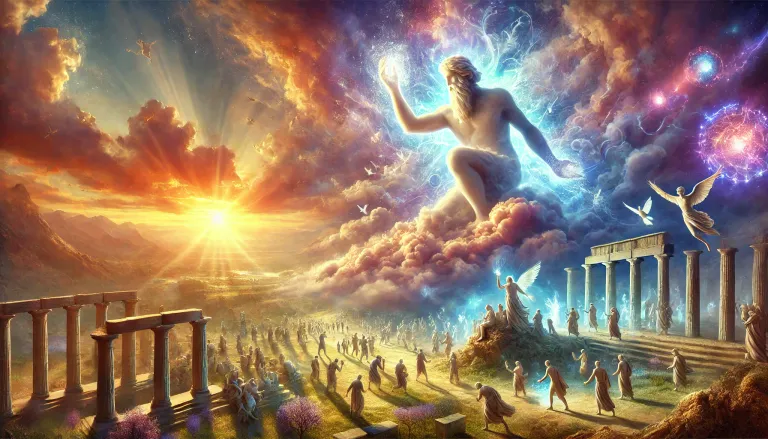Creation of God: Making a way for exploitation of natural resources
Greetings friends!
When our ancestors were still primates, they lived without the burden of worldly affairs. As humans settled down, they began to contend with nature’s fury like floods, forest fires, earthquakes, extreme temperatures, snow, droughts, and countless other calamities that devastated human lives, livestock, and crops. Since the dawn of civilization, natural disasters have been a formidable challenge for humans.

In an effort to mitigate these effects, early humans turned to worship natural forces, attributing them as the divine powers. They venerated celestial bodies such as the Sun, Moon, and planets, and revered the elemental forces of wind, fire, and water. Many cultures even worshipped the nurturing aspect of nature through the figure of the mother. It was believed that by pleasing these natural forces, they could save themselves from the relentless wrath of nature. This widespread belief in the sacredness of nature marked the age of animism in primitive civilizations.
Yet nature, in its indifferent grandeur, never expected or responded to human worship. No matter how fervently our ancestors prayed, the physical laws governing natural calamities remained unchanged. Over time, as they recognized the futility of their efforts, humans began to reframe these powers. They personified natural forces and eventually organized them into pantheons with hierarchical structures. Leaders emerged among these gods viz. Zeus in Greek culture, Jupiter in Roman tradition, and Indra in Hindu mythology, each presiding over a host of deities.
However, the diversity of gods also sowed seeds of division, making it difficult for powerful rulers to govern people with varied beliefs. To unify their subjects and consolidate their power, some wise men proposed the idea of a single supreme power and named it God. This concept of an omnipresent, omniscient, and omnipotent deity served several purposes. It not only simplified religious practice and helped centralize authority, but it also provided a way for people to rationalize the unyielding forces of nature. By subjugating nature under the dominion of one supreme entity, the once-revered natural world was effectively diminished and made subservient to God. It also made easing of the collective guilt associated with nature’s exploitation. As humans have realized that God is supreme and nature is just its servant, they relentlessly started exploiting nature without feeling a sense of guilt in their acts.
This shift in belief had far-reaching consequences. The idea of one God allowed societies to overcome the fear of ravaging natural forces, but it also paved the way for numerous challenges, such as the establishment of a divine right for kings, political and economic exploitation, and religious intolerance. Although some argue that monotheism fosters a sense of equality and unity, history has shown that it can also lead to dogmatism and violence. Polytheistic traditions, in contrast, were more flexible, as the incorporation of a single deity was less disruptive to their existing belief systems.
In short, the evolution from animism to monotheism is one of the most significant transformations in human history. What began as a desperate attempt to appease the uncontrollable forces of nature eventually redefined societal structures and human relationships with power and the environment. While the concept of one supreme God helped unifying communities and provided solace in the face of natural calamities, it also led to formation of the systems of exploitation and intolerance.
That's it for today. Have a wonderful time.
Image above is AI generated.
theres a lot of changes. peoples live is more easier on the new technologies but we did not notice we clearly destroy humanity and the earth.
An analytical and highly thought provoking post dear.
Thank you for posting in the Ecency community
You receive upvotes and Ecency points